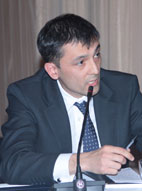
IMF representative says Lari devaluation was necessary
By Tatia Megeneishvili
Thursday, May 21
The International Monetary Fund’s (IMF) Resident Representative in Georgia Azim Sadikov has stated that Lari has a bright future and so does Georgia in an interview with the Business Press News (BPN).
"Despite the devaluation against USD, trust in the Georgian national currency still exists. Increased flexibility of Lari will promote the development of Georgia in the mid-term,” stated Sadikov.
According to Sadikov, the IMF believes that keeping the Lari in fluctuation and possibly devaluation is the best reaction to economic shocks.
"Such kind of events create an opportunity for the exchange rate to shield the true economy from pressure, but in a highly dollarized economy, like the Georgian economy is, it must be recognized that devaluation creates problems for people who have loans in dollars. It is important to find ways to alleviate this pain at least partially, and it must be done in a short time,” stated Sadikov.
According to Sadikov, in the mid-term, the government must strengthen its efforts to move away from a dollarized economy, limiting the effects of currency fluctuation.
Sadikov stated that if the Lari stayed still and did not devaluate it would lose its competitiveness.
“It would affect not only the competitiveness but would reflect negatively on tourism and business too. I understand that for people who have loans in USD now is a hard period, but in the long term aspect Lari was able to keep its future,” stated Sadikov.
According to him, if the economy was a bit less dollarized, then most people would focus only on inflation and exchange rate fluctuations and would not feel the negative aspects that bad.
“Businessmen have welcomed the notion of a more competitive Lari. Good examples of successful de-dollarization are Israel and Turkey. The Georgian government should do the same as soon as possible. Meanwhile, Georgian banks must do their best to relieve the situation of their clients by overlooking the conditions,” stated Sadikov.


